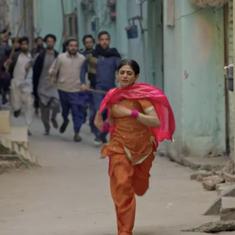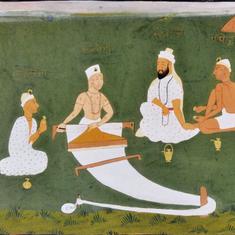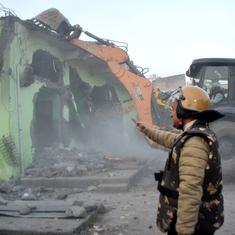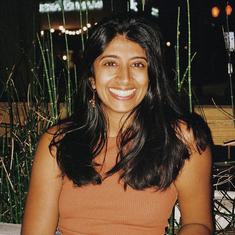The Muslims of Uttar Pradesh have become an enigma because they are cocooned in fear and are gripped by misery. This is palpable in the contradictory positions they take. In one breath, they express anger against the Samajwadi Party for the spurt in communal violence and tension under its rule. In the other, they admit to being anxious about the bitter feud in the party, believing a divide or split could enable the Bharatiya Janata Party to win the Assembly elections due early next year.
As Chief Minister Akhilesh Yadav boarded his rath on November 3 for a campaign tour of the state, the Muslim community has a litany of complaints against him – and a bouquet of plaudits. Topping the list is the question: Why did his father, Mulayam Singh Yadav, promise 18% reservations in educational institutions and government jobs for Muslims even though he knew it was not permissible under the Constitution? Their answer: To fool Muslims.
They are also bitter about the Samajwadi Party government allegedly reneging on its promise to release innocent Muslims implicated in terror cases. In fact, the reverse has happened, they allege, citing the government’s case against Naushad Ali, who was accused of being a member of the operatives of the Harkat-ul-Jihad-al-Islam group. In 2015, a Lucknow court acquitted Naushad Ali and five others of the charge of conspiring to carry out terror attacks. “Yet the Akhilesh government went in appeal against Naushad Ali to the high court. Why?” asked Mohammad Shoaib, lawyer and president of the activist group Rihai Manch.
The Muslim narrative in Uttar Pradesh often mentions the deaths of Khalid Mujahid and Ziaul Haq. Khalid, a madrassa teacher, died in police custody in 2013. An inquiry panel had disclosed that the police had abducted and implicated him in a terror case in 2007. Police officer Haq was murdered in Pratapgarh district in 2013 and Raghuraj Pratap Singh, popularly known as Raja Bhaiyya and a minister in the Akhilesh Yadav cabinet, was said to have been the mastermind. Singh resigned in March that year but was reinstated seven months later.
The Muslims ask: With his party enjoying a comfortable majority, why did Akhilesh Yadav have to bring back Raja Bhaiyya?
“That is because he [Akhilesh Yadav] is pursuing soft Hindutva,” said Obaidullah Nasir, editor of the Urdu newspaper Avadhnama.
According to this theory, to which many subscribe, the chief minister is following a version of Prime Minister Narendra Modi’s political strategy – harping on development while pandering to Hindu sentiment, thus hoping to counter the BJP’s Hindutva with a brand of his own.
As proof of this, they point to the fact that Yadav announced a Ramlila theme park in Ayodhya as soon as the BJP declared its intention to establish a Ram museum there. They also note that Yadav’s seven model cities, planned as a counter to Modi’s smart cities project, are all connected to Hindu mythology. The Uttar Pradesh chief minister also kicked off construction of the world’s tallest temple in Mathura and announced financial assistance to elderly citizens who wish to go on pilgrimage to Hardwar and Rishikesh.
All this would not have mattered to Muslims in the state but for the exceptional rise in communal clashes during Yadav’s rule. The list is long: Muzaffarnagar, Bareilly, Bijnor, Saharanpur, Moradabad and Dadri among others. Add to this the harassment of Muslims by cow protectionists and proponents of love jihad and ghar wapsi. All these incidents have made the community nostalgic about the five years (2007-2012) when Mayawati’s Bahujan Samaj Party governed the state. They claim that any communal ember then was put out before it turned into a raging fire.
Love-hate relationship
With their long list of complaints against the Samajwadi Party, Muslims should have, logically, been happy with the internecine war in the state’s principal Yadav family – in which Akhilesh Yadav is pitted against his father, Mulayam Singh Yadav, and uncle, Shivpal Yadav. A weak Samajwadi Party, after all, would leave no confusion in the minds of Muslims that the Bahujan Samaj Party is best placed to vanquish the BJP, defeating which is their principal motivation.
But no, the Muslims of Uttar Pradesh don’t want the Samajwadi Party to be weakened. That is because they are not sure if the Bahujan Samaj Party has what it takes to challenge the BJP on its own.
Then there is Akhilesh Yadav’s focus on development and his emergence as a youth icon. Muslims are as influenced as anybody else by the popular perception that the 43-year-old chief minister means well, and believe that his family and seniors in the party have circumscribed his autonomy. “Because of his development agenda, Akhilesh has risen above caste and religion,” said Professor Aftab Ahmad of Banaras Hindu University. “Muslims will make a terrible mistake by not voting for him or by being swayed by emotive or religious issues.”
Despite Akhilesh Yadav’s appeal, almost all agree that Mayawati will get more than the 20% of Muslim votes she bagged in the last Assembly elections in 2012. Statistically, just 3.2% of votes had separated the victorious Samajwadi Party from the vanquished Bahujan Samaj Party then. Asif Burney, editor of the Urdu daily Waris-e-Awadh, said, “Assume the BSP gets 10%-15% more Muslim votes than it did in 2012, and the gap between it and the SP will get automatically bridged.”
This proposition presupposes that factors determining the elections will remain constant. For instance, can the Bahujan Samaj Party be sure that Brahmins are as unabashedly inclined to it as they were in 2007, and a little less so in 2012? What impact will a possible alliance between the Samajwadi Party, Congress and Ajit Singh’s Rashtriya Lok Dal have on the Muslim voting behaviour?
Mirza Asmer Beg, who teaches political science at Aligarh Muslim University and is a member of the Centre for the Study of Developing Societies that conducts poll surveys, cautioned, “What is good in theory need not be so on the ground.”
A pre-election survey conducted by the centre three months ago showed the Samajwadi Party still enjoys the overwhelming support of Muslims. “There have been 1,000 communal incidents in UP during Akhilesh’s rule,” Beg said, explaining the poll. “Fortunately for the SP, Muslims believe that to be safe in UP, that party is still their best option.” However, he pointed out that this could change, especially with Mayawati aggressively courting Muslims now.
The BSP factor
Mayawati’s aggression is linked to the Una incident in July – when a group of Dalits in the Gujarat town were assaulted for skinning a dead cow – that has evoked an image of Dalit-Muslim unity.
“They are Dalit by zaat [caste], we Muslims are Dalit by halaat [circumstance],” said poet Munawwar Rana, who returned his Sahitya Akademi award in protest against the lynching of Mohammed Akhlaq over beef rumours in Dadri in Uttar Pradesh last year. “Every Muslim felt the whiplash of Una on his back.”
This caused Tasleem A Rahmani, president of the Muslim Political Council of India, to say, “The BJP considers the BSP its principal ideological foe, and for this reason alone, Muslims should think of the BSP as their best bet.”
But the community is not yet convinced, and will not think of Mayawati as their best option unless she visibly demonstrates that she has the support of other social groups – for instance, the most backward castes, some of whose leaders have deserted her. Do they still support her? Can the Bahujan Samaj Party dramatically improve upon the 15 out of 85 reserved constituencies it won in 2012?
“The party has deployed Brahmins in reserved constituencies to work on non-Dalits,” said a party insider. “Since every party must field a Dalit candidate, our Dalit votes get split.”
For sure, Una should have brought about Dalit solidarity. But it is moot whether it will be to the degree witnessed in 2007, when 86% of Jatav votes and 71% of Balmiki votes went to the Bahujan Samaj Party.
Theoretically, a large section of Muslims, too, should have gravitated to the Bahujan Samaj Party as they share the economic status of Dalits, besides bearing the brunt of Hindutva aggression. But they have not because of the party’s ideological ambitions and organisational design.
Ideological differences
For one, the Bahujan Samaj Party sees itself as a movement that aims to bring about a social transformation in India, winning dignity and self-respect for subaltern social groups. Electoral politics is a dominant tool to achieve these aims, but not the only tool, as it is for most centrist formations. It does not pamper individuals, and does not encourage patron-client relationships.
“Only a few tickets are given to people who can influence election outcomes individually,” said the party insider who did not wish to be identified. “The rest are given to candidates after Behenji (Mayawati) judges them on their contribution to the BSP’s social movement.”
This means the party’s doors are closed to those to who treat politics as just a career.
It is also true that the party places great emphasis on political vocabulary, drawing its ideological inspiration from Dr BR Ambedkar and its founder, Kanshi Ram. This becomes an impediment for Muslims who wish to join the party. For instance, poet Munawwar Rana is self-avowedly keen to join the party, which in turn has sent its men to visit him. But he has not yet been inducted into the party.
“I don’t know about Rana,” said the party official. “But for any poet to join the party, the leadership will see whether Ambedkar or Kanshi Ram appear in his verses and whether he speaks of our vision.”
There is no appreciation of the fact that the Muslim political vocabulary cannot be similar to that of Dalits as their historical experiences are decidedly different. It rules out several Muslims who command social and cultural influence, as Rana certainly does.
Organisational hurdles
There is also the organisational make-up of the Bahujan Samaj Party that prevent Muslims from fully supporting it.
A Muslim member of the party, who fought an election on its ticket, said a large percentage of tickets are allocated to Muslims in the state. But it is the party officials rather than its MLAs and MPs who call the shots. “A BSP coordinator and the district president decide what you can speak or how you are to run your campaign,” said the leader, who did not wish to be identified.
What this means is that a Muslim candidate cannot take a position or speak on a contentious matter affecting his community until the party line on it has been laid out. “Why, even Naseemuddin Siddiqui and Munquad Ali, the BSP’s Muslim faces, go to Muslims and speak about Ambedkar and Kanshi Ram,” the Muslim leader said. “They can’t issue a statement as, say, SP’s Azam Khan does.”
The greater autonomy that Muslim leaders of other parties enjoy enables them to fashion their own strategy to widen their base in the Muslim community, and therefore of their parties as well.
Muslims also cannot hope to occupy key organisational positions in the Bahujan Samaj Party. The district president has to be a Jatav, as are most of the district coordinators, though this position has been assigned to others as well of late. They are Mayawati’s eyes and ears, their words count for more than those of an MLA or MP. This ideological and organisational rigidity has restricted the party’s expansion that would have been possible otherwise.
A sense of superiority also plays a part in keeping the community away from the party.
“There are two aspects of the Muslim psyche,” said a former MP and one-time member of the Bahujan Samaj Party. “One, he is conscious that his community ruled the country for 800 years, and it has bred a feeling of superiority in him. Two, he is mortally scared of the BJP and doubtful of his status in India, and consequently suffers from a psychosis.”
From this perspective, its chafes Muslims to be under the control of Jatavs, whom they consider inferior to themselves. This is further compounded by caste consciousness among a significant section of Muslims.
Since the Ashrafs or upper-caste Muslims dominate the community leadership, many argue that the Bahujan Samaj Party should focus on mobilising the Pasmanda (lower-class) Muslims rather than the entire community. Yet, even the Pasmanda Muslims will not veer towards the party as long as they are not accorded the same status as Jatavs in the organisation.
Tasleem A Rahmani of the Muslim Political Council of India said, “Pasmanda Muslim should unite on a platform and show to the political parties that they can make a difference between winning and losing. Only then will political parties give them importance.”
Undecided till the end
Amid this confusion and driven by their obsession with the BJP, Muslims in Uttar Pradesh are known to take a final call on their vote just two days before polling day. This call varies from constituency to constituency. In case there is consensus in the community that a certain party is most likely to defeat the BJP, then voters earlier committed to other players switch to that party to win.
“In this context, why should anyone care for Muslims?” asked the former MP. “Why should anyone give them more than the crumbs [of power]?”
In the coming days, if Akhilesh Yadav’s yatra turns out to be a rousing success, the community will all swing behind him and forget their complaints against him until two days before the polls.
Indeed, the Muslims of Uttar Pradesh appear so enigmatic because they have let fear trump ideological commitment.
The writer is a journalist in Delhi. His novel, The Hour Before Dawn, has as its backdrop the demolition of the Babri Masjid.










